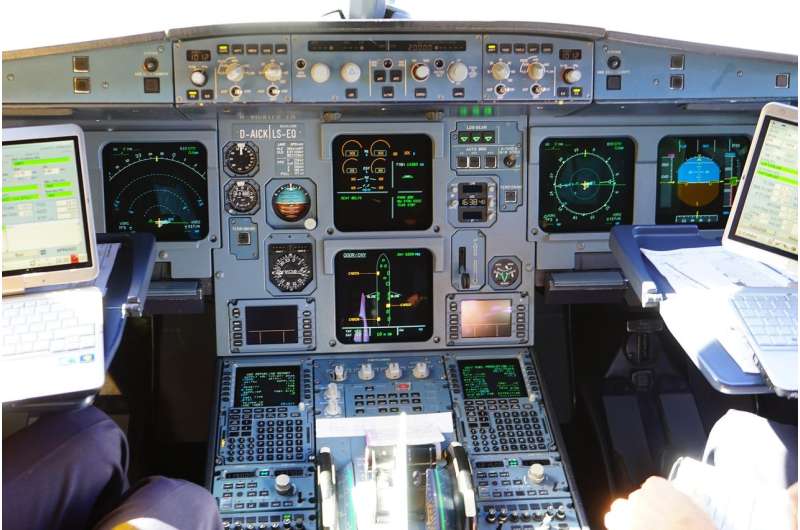Carbon dioxide levels on flight deck affect airline pilot performance

Commercial airline pilots were significantly better at performing advanced maneuvers in a flight simulator when carbon dioxide (CO2) levels on the flight deck (cockpit) were 700 parts per million (ppm) and 1500 ppm than when they were 2,500 ppm, according to new research led by Harvard T.H. School of Public Health. The study indicates that CO2 levels directly affect pilots' flight performance.
"Flying is safe, no question," said Joseph Allen, assistant professor of exposure assessment science and principal investigator of the study. "The entire flight experience is designed around a culture of 'safety first.' Optimizing air quality on the flight deck must continue to be a part of that safety equation."
The study will be published online Wednesday, August 8, 2018 in the Journal of Exposure Science & Environmental Epidemiology.
Previous research led by Allen and colleagues found that, in office buildings, CO2 concentrations between 1,000 ppm and 2,500 ppm—levels once thought to be benign—negatively impact the cognitive function of employees. For the new study, they wanted to determine if higher CO2 levels on the flight deck would impair a pilot's ability to perform advanced maneuvers and manage emergency situations, such as a single-engine failure during takeoff.
The researchers recruited 30 male commercial airline pilots and split them into teams of two. Each team was asked to perform three 3-hour-long flight simulations that consisted of 21 maneuvers of varying degrees of difficulty without the aid of autopilot. Both pilots on each team took a 90-minute turn as the flying pilot during each simulation. CO2 levels were randomized to either 700 ppm, 1,500 ppm, or 2,500 ppm, and each pilot flew one flight at each CO2 level over the course of the study. A Federal Aviation Administration (FAA) Designated Pilot Examiner monitored and assessed all simulations, and the pilots and the FAA examiner were unaware of the CO2 levels during the simulations.
The findings showed that the pilots were 69% more likely to receive a passing grade on a maneuver when CO2 levels were 700 ppm compared with 2,500 ppm. When CO2 levels were 1,500 ppm, the pilots were 52% more likely to successfully perform a maneuver than when CO2 levels were 2,500 ppm. When the researchers compared the difference in pilot performance at 700 ppm and 1,500 ppm, the difference was not statistically significant, but they did find that pilots were more likely to successfully perform some of the most difficult maneuvers at the lower CO2 level. The study also found that the negative effects of CO2 on flight performance became more pronounced the longer the pilots were in the simulator.
While data on CO2 levels on flight decks are limited, previous research has shown that average CO2 levels on the flight deck are less than 800 ppm. However, they have been measured as high as 2,000 ppm on the flight deck and even higher in the cabin during the boarding process, depending on the type of airplane and other factors. While the FAA has regulations pertaining to airplanes' environmental control systems, the National Research Council has suggested that current standards for ventilation rates on flight decks may be inadequate.
"Using a flight simulator gave us a unique opportunity to test the impact of extreme, but rare, events in airplanes," said Piers MacNaughton, research fellow and one of the investigators on the study. "Our results suggest that we need to know more about how air quality on the flight deck can be used to enhance pilot performance."
More information: Joseph G. Allen et al, Airplane pilot flight performance on 21 maneuvers in a flight simulator under varying carbon dioxide concentrations, Journal of Exposure Science & Environmental Epidemiology (2018). DOI: 10.1038/s41370-018-0055-8


















